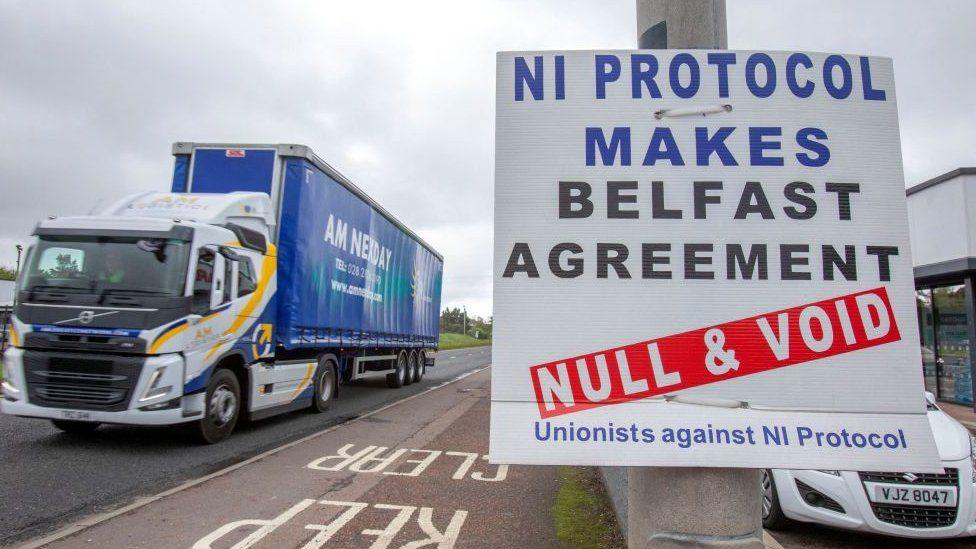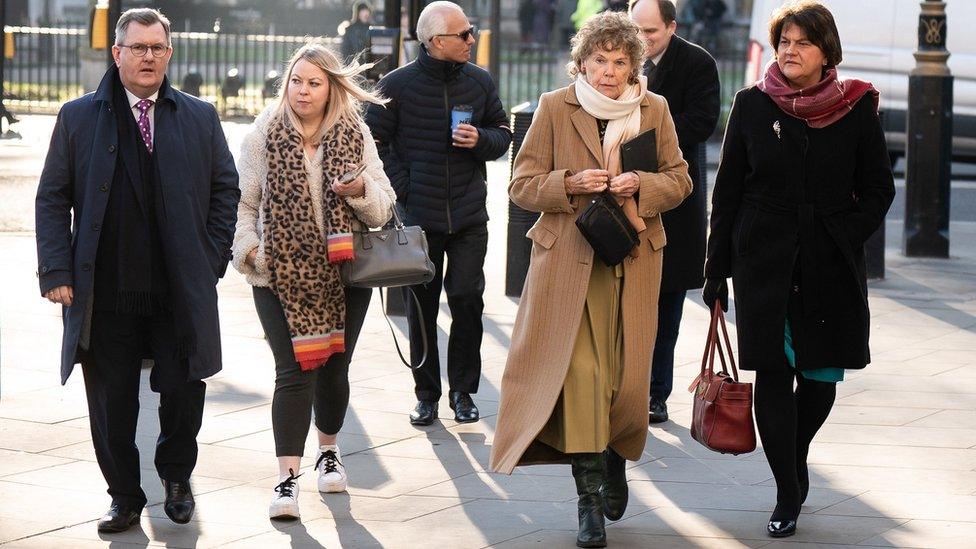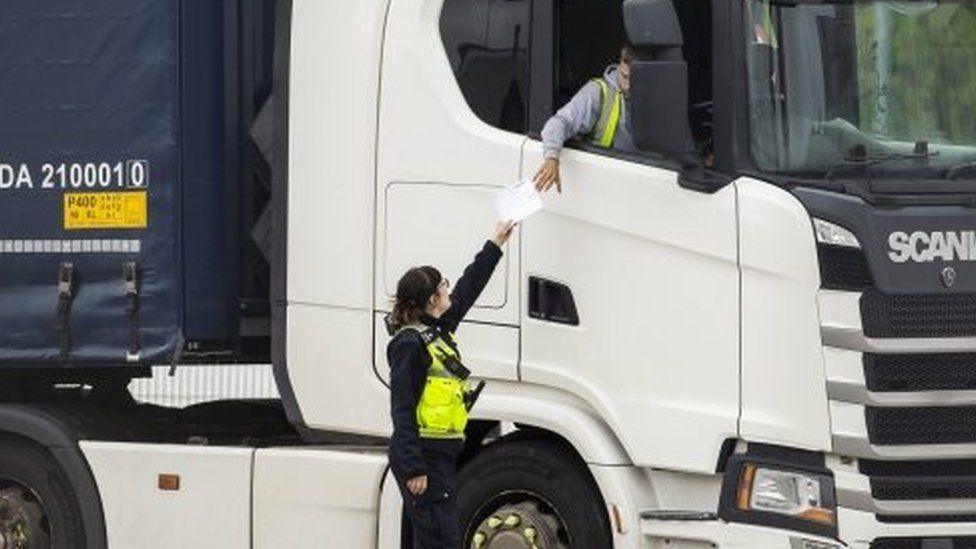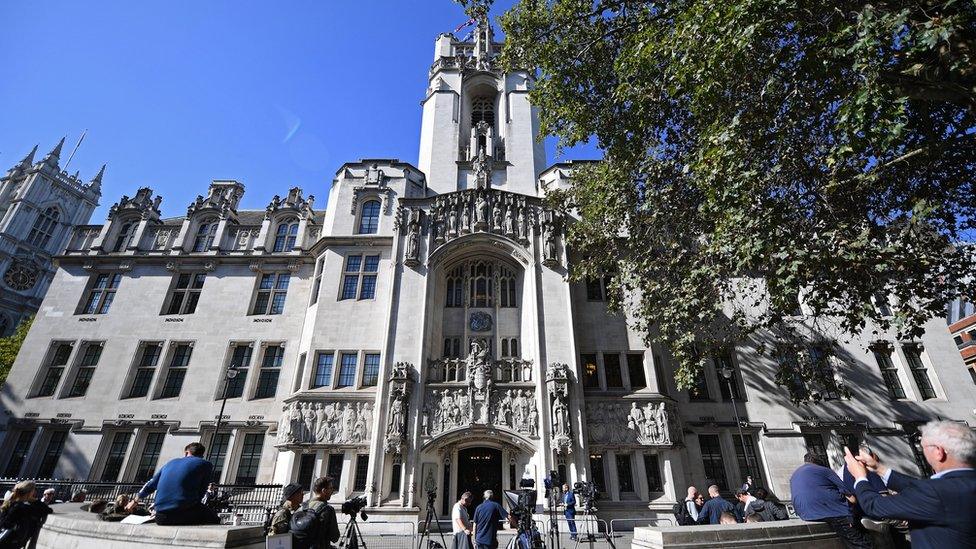Northern Ireland Protocol is lawful, Supreme Court rules
- Published
- comments

All unionist parties in Northern Ireland oppose the protocol and the DUP is refusing to re-enter power sharing until it is replaced
The Northern Ireland Protocol is lawful, the UK Supreme Court has ruled.
Part of the Brexit deal, the protocol creates a trade border between Northern Ireland and the rest of the UK.
It has been challenged by unionist politicians who say it breaches the Acts of Union and the Northern Ireland Act.
The court unanimously rejected their appeal on all grounds. It had previously been rejected by the High Court and Court of Appeal.
The protocol was agreed by the UK and EU in 2019 to ensure free movement of trade across the Irish land border after Brexit.
However, it means there are new checks and controls on goods entering Northern Ireland from Great Britain.
The unionist case had three aspects:
That the protocol unlawfully conflicted with the part of the Acts of Union which says all parts of the UK must be treated equally in matter of trade
That the protocol changed Northern Ireland's constitutional status without a referendum, as required by the Northern Ireland Act
That the secretary of state did not have the power to change Stormont's cross community voting rules in relation to the protocol.
The court agreed that the protocol does conflict with the Acts of Union.
However, it added that it was Parliament's will that any part of the Acts of Union which conflict with the protocol are suspended.
Sir Jeffrey Donaldson says the UK government must ensure Northern Ireland's position in the UK is maintained
The judges said: "Parliament, by enacting the 2018 Act and the European Union (Withdrawal Agreement) Act 2020, authorised the making of the protocol.
"The clear intention of Parliament in enacting these Acts was to permit the Crown to make the protocol."
On the second ground the court said the relevant part of the Northern Ireland Act only concerns a referendum about whether Northern Ireland remains part of the UK or joins a united Ireland.
On the third ground the court found that Parliament had empowered the secretary of state to lawfully make changes to voting rules.

DUP leader Sir Jeffrey Donaldson (left), Baroness Kate Hoey (second right), and former first minister Dame Arlene Foster (right) outside the UK Supreme Court in London
'Union is broken'
Responding to the ruling, a government spokesperson said: "We welcome that the Supreme Court has reaffirmed the sovereignty of Parliament in approving and legislating for the agreement negotiated in 2019.
"However, this does not change our determination to address the real problems the protocol is causing in Northern Ireland. Intensive talks with the EU continue to that end, looking across the full range of issues we have raised."
A UK government source told the BBC there was "lots still to work through" on protocol talks.
They were speaking before a meeting between Northern Ireland Secretary Chris Heaton-Harris and the EU's Maros Sefcovic, which took place on Wednesday afternoon.
The pair held talks in Brussels, as Mr Heaton-Harris also attended a separate event tied to the anniversary of the Good Friday Agreement.
After the meeting, he said he and Mr Sefcovic "agreed solutions to the protocol must work for benefit of all communities and businesses in Northern Ireland".
Allow X content?
This article contains content provided by X. We ask for your permission before anything is loaded, as they may be using cookies and other technologies. You may want to read X’s cookie policy, external and privacy policy, external before accepting. To view this content choose ‘accept and continue’.
Ministers overseeing the negotiations are said to be focused on making sure solutions reflect the "realities" on the ground.
The Democratic Unionist Party (DUP) withdrew from the power sharing executive in Northern Ireland in February 2022 in protest at the protocol.
DUP leader Sir Jeffrey Donaldson said the legal challenge "had highlighted why unionists are opposed to the trading arrangements".
"A solution to the protocol was never going to be found in the courts, but the cases have served to highlight some of the reasons why unionists have uniformly rejected the protocol," he added.
"The government must consider this judgment, their own arguments to the court and take the steps necessary to replace the protocol with arrangements that unionists can support."
Jim Allister of TUV said the court's ruling greatly strengthens his party's stance and it "must embolden the political campaign against the protocol".
"The fact the Supreme Court is satisfied it was lawfully made does not in the least affect its political unacceptability, nor its dire constitutional consequences," he added.
'Imperfect, but necessary'

The protocol introduced checks on goods entering Northern Ireland from Great Britain
Sinn Féin Brexit spokesperson Declan Kearney welcomed the judgement, adding the protocol was "imperfect" but "clearly necessary".
"Now that legal clarity has been confirmed, it is time to move forward politically and ensure that a deal between the British Government and EU to deliver pragmatic and durable solutions is secured without delay that makes the protocol work better for everyone."
The Social Democratic and Labour Party said the ruling provided "important clarity" on the legality of the protocol.
"Following this judgment, it is now critical that the EU and UK negotiating teams reach a comprehensive resolution that protects our unique access to the Single Market for goods while addressing the concerns around protocol implementation that have given rise to sincere objections related to trade barriers and identity issues in the unionist community," assembly member Matthew O'Toole said.
Alliance deputy leader Stephen Farry said political parties in Northern Ireland needed to "focus on pragmatic solutions going forward" after the Supreme Court's ruling, which he added "was not surprising in the slightest".
"Northern Ireland was always going to require some special arrangements in the context of a hard Brexit. This protocol or something similar is therefore the inevitable outcome of choices made, and the consequent need to address this region's particular circumstances and to protect the Good Friday Agreement."
The Supreme Court is the final court of appeal in the UK for civil cases.
It hears cases considered to be of the greatest public or constitutional importance affecting the whole population.
A five-judge panel, including Lord Reed, the president of the court, heard the case over two days in November.
Related topics
- Published2 February 2024

- Published2 February 2023

- Published30 November 2022

- Published1 December 2022
